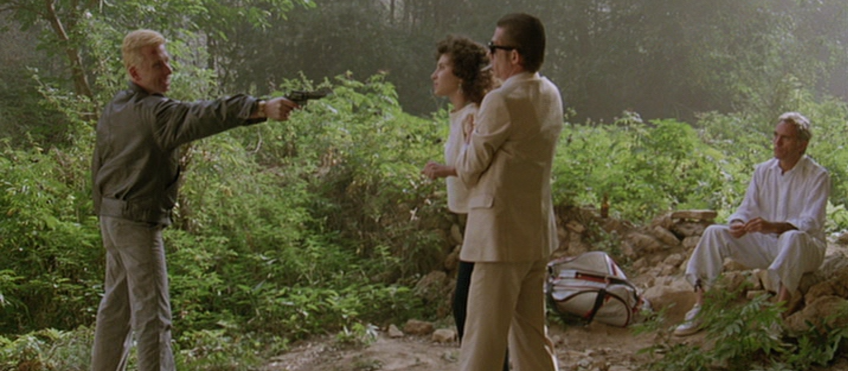
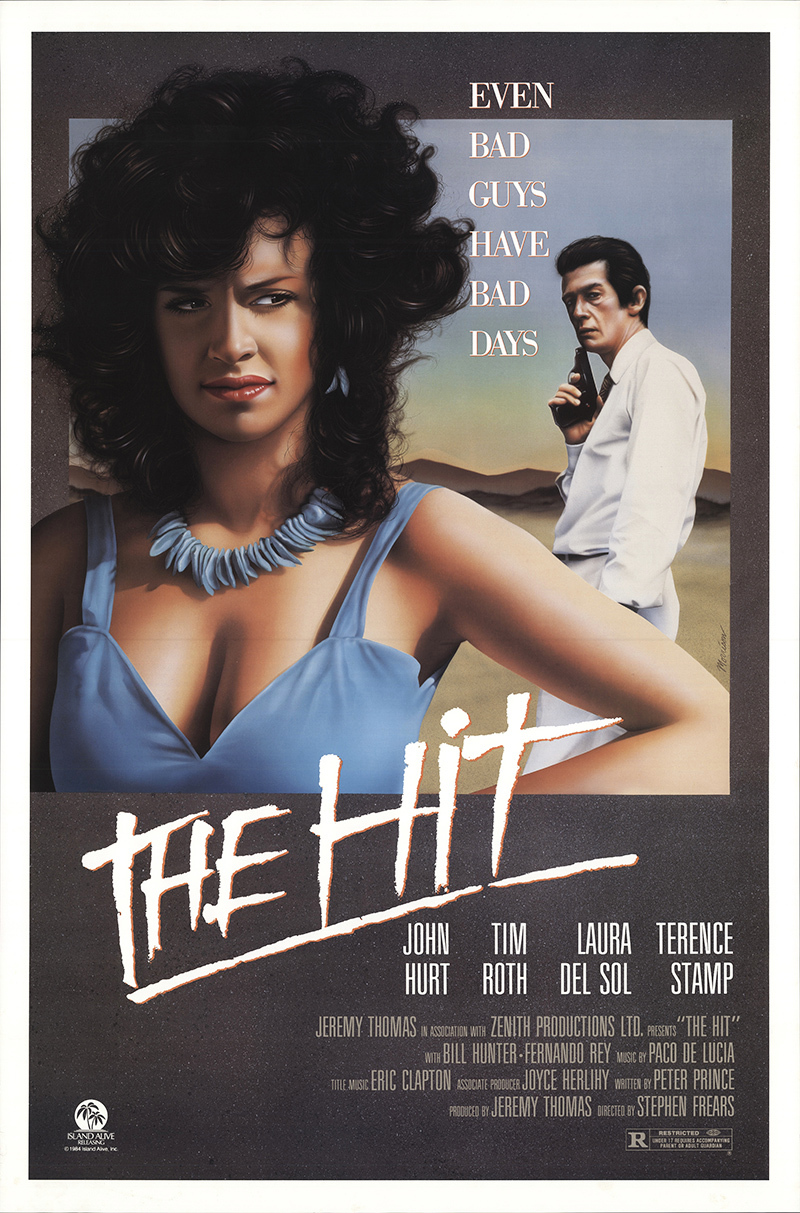
“Death is just a stage in the journey. We’re all gonna get there. No exceptions. Me and you and… it’s just a moment. We’re here, then we’re not here. We’re somewhere else… maybe. And it’s as natural as breathing. Why should we be scared?”
The premise of The Hit is as simple as they come: a gangster turned informer is to be snatched and taken to those he betrayed in order for them to personally enact revenge on him. It is not complex, and even as it morphs into a road movie partway through, the film does not evolve into a complex narrative. It is told in a straightforward manner, and director Stephen Frears relies on a trio of outstanding performances in order to transcend the basic plot: those of Terence Stamp, John Hurt and Tim Roth.
The film begins with the trial of Willie Parker (Stamp), who describes his roles in various criminal activities throughout the years, deciding to incriminate his compatriots in exchange for a sweet deal from the police. As the trial ends, the men who he has betrayed begin singing the famous World War II era song “We’ll Meet Again” in unison.
We jump forward, and find Parker has been hiding out in Spain for a decade, reading, thinking and meditating. He is no longer a criminal; he is dressed in all white to signify his innocence as he lives the life of some kind of enlightened mystic, posturing as fey and equanimous, yet also possessed of a dry wit. He understands that when the kingpin he put behind bars got out of prison, it was only a matter of time before the syndicate caught up with him. When he is snatched from his idyllic, book-filled abode by a group of amateurs, he puts up only a brief fight. It seems clear that he has come to terms with and accepted his inevitable death. But there is still a long road ahead. The kidnappers transfer their victim to Braddock (Hurt) and his sidekick Myron (Roth), who are tasked with transporting Willie from Spain to France where he will meet his fate.
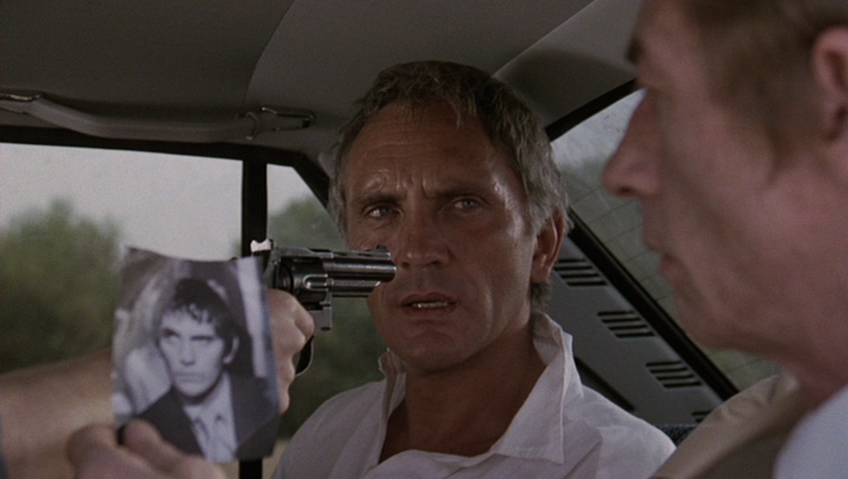
Willie is almost cheerful as their trip begins. He sings the Vera Lynn classic to himself in the back of the car: “We’ll meet again. Don’t know where, don’t know when. But I know we’ll meet again some sunny day.” Myron is a rookie; he talks too much and is too quick to allow his temper to flare up. Braddock is an experienced hit man and consummate professional, speaking only when necessary.
The Spanish news radio tells them that the amateurs kidnappers had run over a cop. Willie humorously must translate for the gangsters.
“Ah, poor old Juan. Seems those fellows who picked me up swiped him on the way out. I thought we hit something… somebody.”
“Swiped who?”
“Juan, Juan Velasquez. He’s a cop. Ah, got the car number. They expect to make arrests at any moment. And there’s a reward for information.”
Braddock decides to head to a safe house in Madrid. At the safe house, they must deal with Harry (Bill Hunter), a former associate of Braddock’s that had been living there with his girlfriend. Braddock believes Harry may be willing to turn them over to the police, so he takes a precaution: they will take Harry’s girlfriend, Maggie (Laura del Sol) with them to buy his silence. Once they reach the car, Braddock has second thoughts and returns to the apartment to permanently silence Harry.
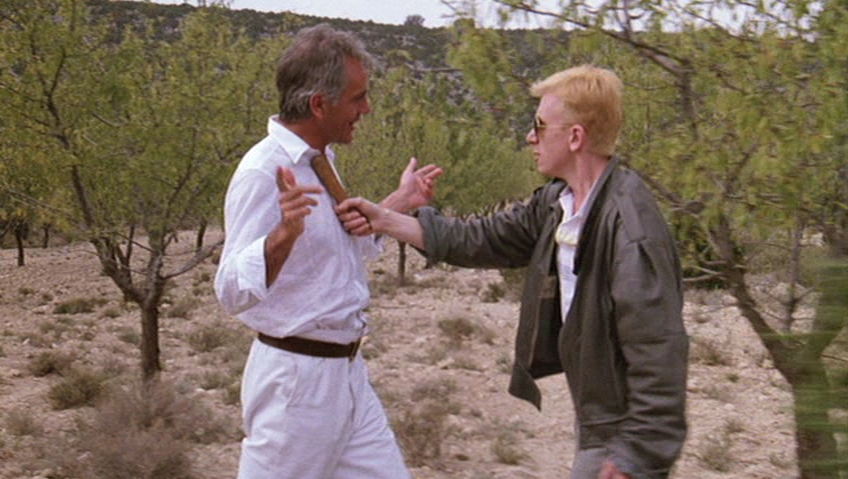
He intends to kill the girl, too, but Myron is attracted to her and feels protective of her, constantly blocking Braddock from doing away with her. There is a lot of time spent with all of the main characters squished into the car; the scenes are always in service of the narrative, but the camerawork gets a bit repetitive. This feeling of repetition, along with the conversational dialogue, engenders a believable sense of familiarity amongst the characters as what began as a gangster film morphs into a kind of road movie. Willie plies Myron with vaguely philosophical musings about the nature of life and death, subtly influencing his allegiance, convincing him that he may need to take the reigns of leadership as Braddock becomes unstable.
The film makes a noticeable shift after a scene where the two of them are outside of the car, relieving themselves side by side. Then, Myron presses a leather cudgel to Willie’s throat and demands an answer from him.
“Alright, I wanna know!”
“Know what?”
“You’ve had something going from the start! You got a plan now, I wanna know now or I swear…”
“I haven’t got any plan.”
“What you so happy about? What’s going on?”
“Nothing’s going on.”
“You silly sod. You’re gonna die!”
“So are you, sooner or later.”
“You’re gonna die fucking soon, mate!”
“I’ll tell you something I read once, Myron. Apparently, what happens to you after death, is not all that much different from what happens to you before death, physically speaking. All part of the same process, you know? So if it’s all the same, really, what’s there to worry about?”
“You’re barmy.”
“Don’t worry about me Myron. Worry about you. Are you really up to this?”
“I ain’t worried about me.”
“Good. Then worry about your boss. Is this job gettin’ him down? Is he making the right decisions? Are you gonna have to take over at some time or another? Think about it. We don’t want anything going wrong.”
From this point on, Myron’s mindset is changed. He is still the quick-tempered, loose-mouthed, and careless rookie, but he seems as much Willie’s protégé as Braddock’s. We also start to doubt whether Willie has found the inner calm he projects, or is playing an elaborate and calculated game to survive.
There is some creative camerawork that is subtle yet effective. There is a long take that is shot from directly overhead as Maggie crawls across the desert floor, her leg wounded, trying to escape from Braddock, before they tussle briefly. The removal of the viewer from the middle of the conflict gives it a sense of universality. The same tactic is used when Myron roughs up a group of hecklers at a roadside bar. In tandem with the scene where Myron and Willie have their confrontational conversation, Braddock and Maggie remain in the car, where he begins treating her roughly, squeezing his hand tightly over her mouth. She bites down hard on his hand, drawing blood; the camera lingers agonizingly throughout the scene, and ends with a shot of the rearview mirror as she flashes a bloody smile at Braddock in the driver’s seat.
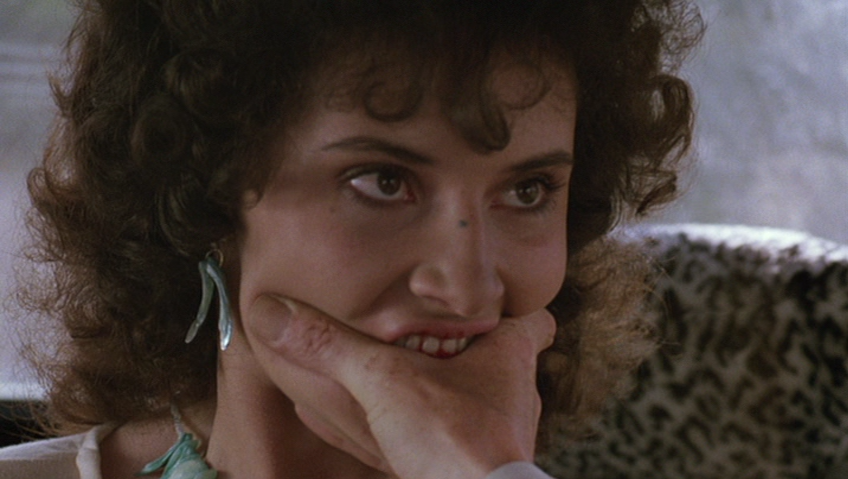
The fatalist dialogue and some suggestive compositions throughout indicate what the movie is generally pointing us toward, but it isn’t until the moonlit conversation between Willie and Braddock that it is articulated succinctly. The film’s shift away from the gangster tropes of its introductory scenes to a more contemplative and philosophical mode of storytelling makes the final scenes much more jarring.
Terence Stamp is nearly perfect as Willie Parker. He had been a star of cinema in the 60s, yet when his relationship with supermodel Jean Shrimpton ended and he was no longer an A-lister, he spent about a decade in lesser roles. The Hit was Stamp’s first starring role since before his self-imposed exile (unless you count his portrayal of General Zod in Superman II), and you can accept that he is now a man of experience, at peace with himself just as Willie Parker is. An enigmatic actor in an enigmatic role.
Tim Roth is raw and energetic as Myron. He has little polish (this was his first theatrical film), and instead plays the rookie assassin with a jittery intensity that suits the character well. When we are introduced to the apprentice hitman, he seems intent to model his behavior after his boss. Though he frequently requires instruction, he seems to understand the reason behind each chastisement. Under the influence of Willie, his loyalty to Braddock gradually diminishes as he becomes a foolhardy wildcard. Frequently overwhelmed or unsure what to do, he nevertheless presents himself as competent and in control of the situation—that is, until his temper takes over. He is also the source of several moments of straight-faced humor. He initially stands too close to Willie when the urinate side-by-side in the woods, he admits that he pretended to know a lot about cars to help himself get the job, and he boasts about making his trusty leather cudgel in “handicrafts” at school years ago.
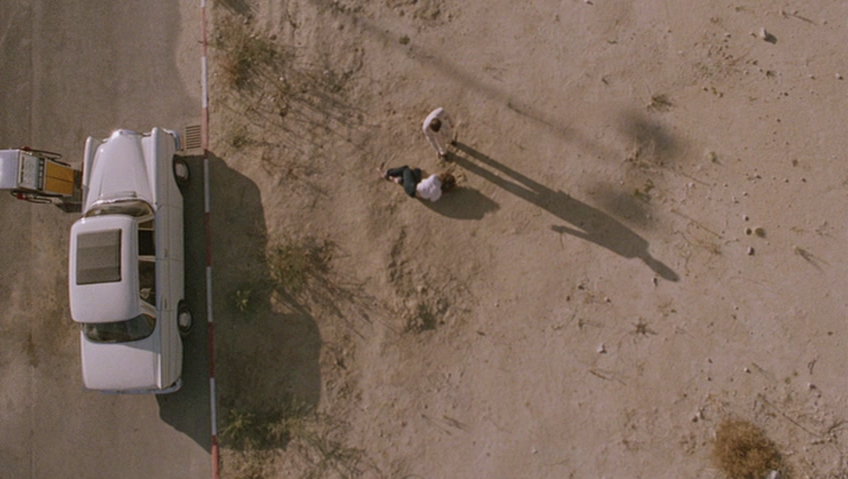
John Hurt plays Braddock as indecipherable for much of the film. Braddock is professional, emotionless, and fluid. He acts only when required, and is here only to see the job through. He does not seem to doubt what he must do to complete the task, but he does show signs of deeper-seated doubts. In almost every encounter in the film, Braddock acts with cold-bloodedness—the only times he chooses not to pull the trigger are ultimately what prove fatal for him; though as he meets his death it seems that perhaps Braddock was the only one who adopted Willie’s outlook. Hurt is the consummate character actor; he seems eternally weather-worn and world-weary, and always nails his roles dependably.
The Hit has a lot going for it: a great cast, creative direction, an excellent soundtrack featuring flamenco guitarist Paco de Lucía throughout and a title theme by Eric Clapton and Roger Waters. It notably did not do well at the box office, likely due to its uncertain genre, typeless characters and unconventional themes. Taking inspiration from an Ambrose Bierce short story, the characters all march toward there inevitable deaths while one thoughtful victim of life philosophizes as his impending execution draws near. It is a lot for a viewer to take in when they go in expecting a gangster film. It holds up well to repeat viewings, and it is no wonder that its reputation has grown over the years.